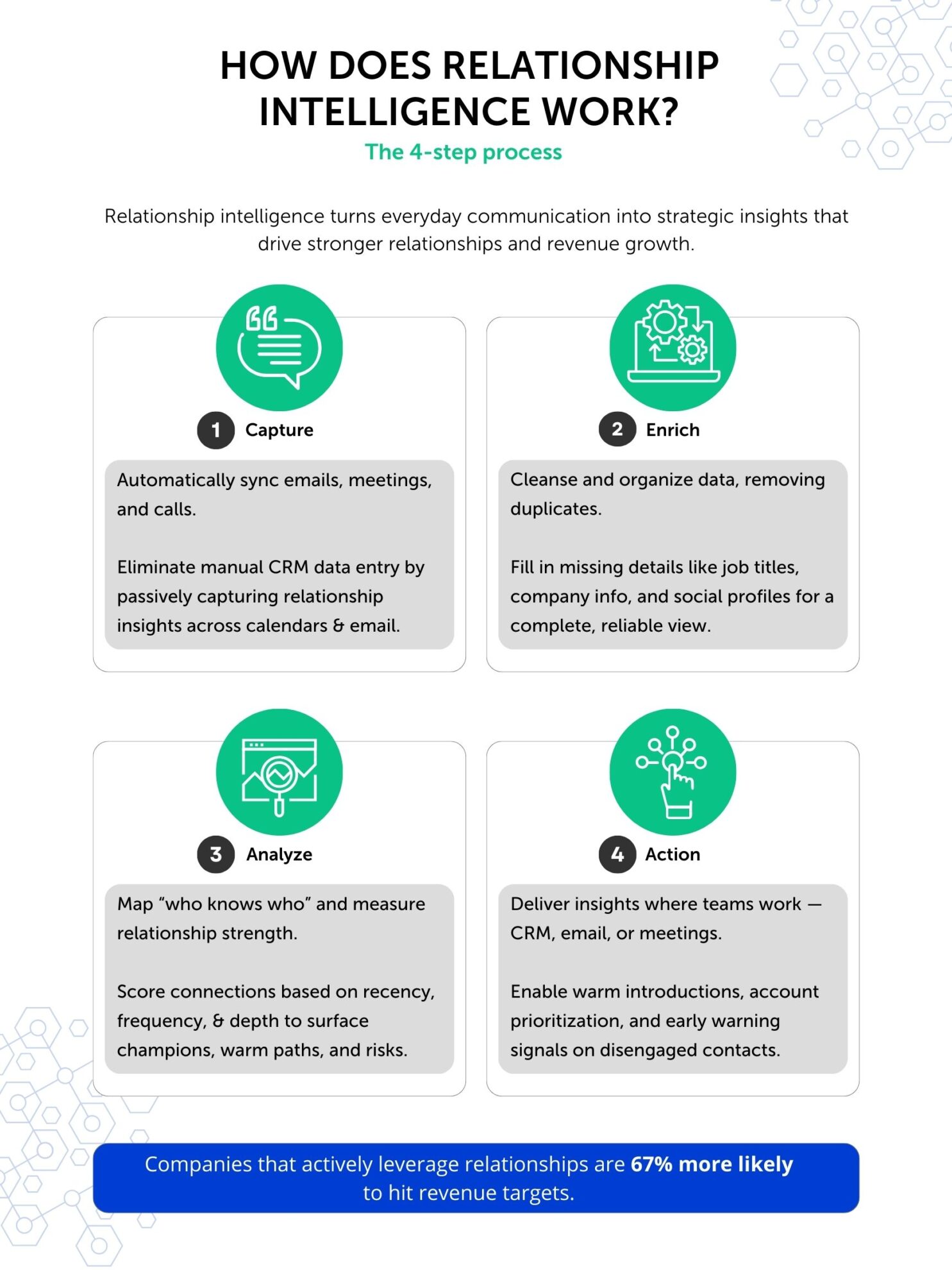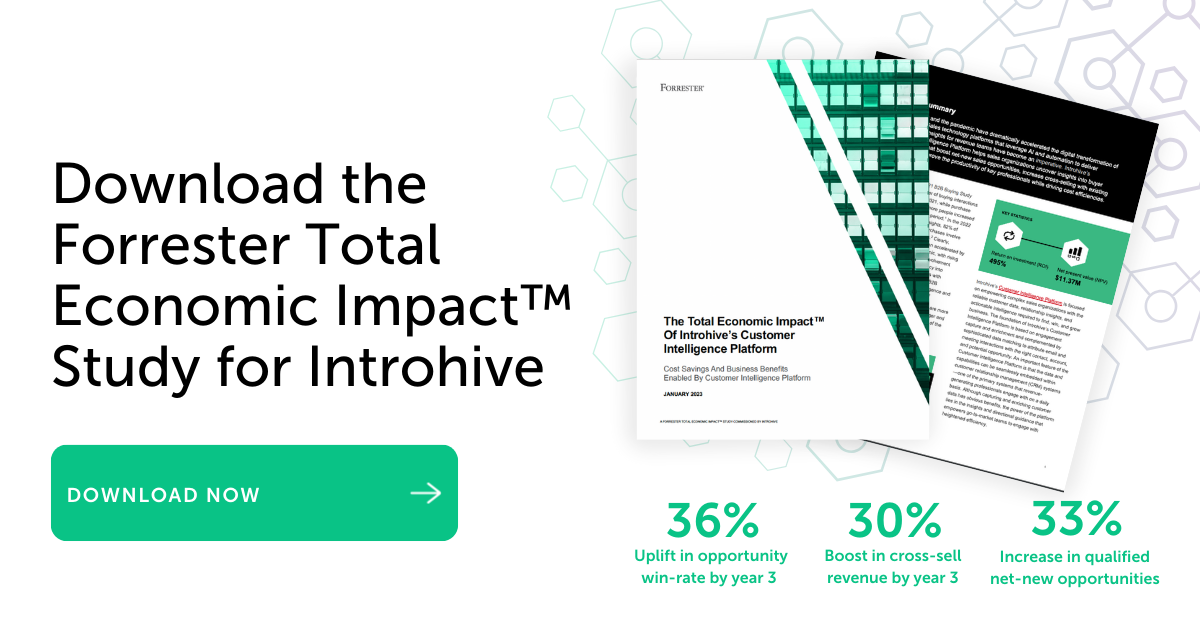The core problem: your CRM is missing 90% of the story
Most CRM systems do what they were designed to do: track interactions with customers and prospects. But for modern sales and business development teams, that’s no longer enough. They need something more strategic: something that reveals hidden opportunities and deeper connections. That’s where relationship intelligence comes in.
Relationship intelligence fills a critical gap that CRM can’t solve alone. Without it, your team is left working from incomplete data, disconnected contacts, and missed warm introductions. CRM records are often inconsistent or outdated, requiring too much manual effort and offering too little in return. According to Forrester, 47% of organizations cite data quality issues and 44% report reliance on manual processes as top CRM challenges, making automation critical to CRM performance and AI readiness
Relationship intelligence, defined
Relationship Intelligence is the automated capture, analysis, and activation of relationship data across your organization’s network. It reveals who knows who, how well, and in what context – surfacing warm introductions, hidden connections, and pathways to revenue that traditional systems often miss.
Instead of relying on manual data entry or siloed tracking tools, Relationship Intelligence continuously maps and enriches the web of people, communications, and interactions that already exist in your business. It connects the dots between emails, meetings, and conversations to show the strength and depth of those relationships.
Where business intelligence focuses on operational and financial data, relationship intelligence shines a light on the human connections that drive growth: the trust, familiarity, and influence behind every successful deal, partnership, or referral.
And as companies look to build deeper, more relevant connections, trusted relationship data is quickly becoming the foundation. In fact, 84% of marketers now prioritize first-party data sources like engagement and interaction history to better understand their audience and tailor outreach accordingly – a shift reflected in Salesforce’s latest State of Marketing report, which highlights the growing reliance on relationship-based insights over third-party data.
Whether you use a CRM or want to enhance collaboration and growth without purchasing a CRM, Relationship Intelligence empowers your team to work smarter by activating trusted networks, accelerating deal cycles, and deepening client loyalty with less guesswork and more strategic clarity.
How does relationship intelligence work? The 4-step process
At its core, relationship intelligence works by surfacing valuable insights hidden in your organization’s day-to-day communications. By automating how relationship data is captured, enriched, analyzed, and delivered, it bridges the gap between siloed systems and strategic engagement. The result: stronger relationships, improved productivity, and more efficient revenue growth.
1. Capture
Automatically sync emails, meetings, and calls.
Relationship intelligence platforms begin by passively capturing relationship insights across communication tools like email and calendars. This eliminates the need for manual CRM data entry, ensuring data is always up to date, without disrupting how people work.
In fact, HubSpot found that 32% of sales professionals spend over an hour a day manually entering data into CRM systems. Automation here reduces that burden significantly.
2. Enrich
Cleanse data and add missing contact details.
Once captured, relationship intelligence platforms enrich and organize the data, standardizing fields, removing duplicates, and filling in missing details such as job titles, company info, and social profiles. This ensures your team has a clean, centralized view of contacts and accounts, ready to act on without needing to dig through disconnected tools or systems.
3. Analyze
Map “who knows who” and score relationship strength.
Relationship intelligence software analyzes the data to uncover real connections within your organization: mapping “who knows who” and how well. It scores relationship strength based on recency, frequency, and depth of interaction, giving teams visibility into trusted contacts, internal champions, and emerging risks.
This kind of relationship mapping enables organizations to identify warm introduction paths and uncover influence that would otherwise remain invisible.
4. Action
Deliver insights and warm introduction paths.
The final step is delivering relationship intelligence where teams need it most, whether in their CRM, email, browser, or meeting workflow. Insights are served in context, helping users identify priority accounts, prepare for meetings, or act on early warning signs like disengaged contacts or competitive signals.
In a recent survey, 90% of employees reported increased productivity through automation, and 85% saw stronger team collaboration, demonstrating the measurable impact of streamlined, intelligent workflows.
In summary, relationship intelligence platforms transform passive communication data into a real-time strategic advantage. In fact, companies that actively leverage both internal and external relationships are 67% more likely to meet their revenue targets, underscoring the measurable impact of relationship-driven go-to-market strategies.
By integrating seamlessly into existing systems and workflows, relationship intelligence automation can help teams uncover hidden connections, strengthen client relationships, and focus their energy where it counts.

5 key benefits of using a relationship intelligence platform
In any growing organization, it’s easy for valuable relationship details to slip through the cracks. A relationship intelligence platform helps connect the dots in relationships between departments, offices, and regions by surfacing the insights hidden in daily interactions across teams. Instead of relying on guesswork or scattered notes, teams get a clearer view of how to build stronger, more productive relationships.
Here are five ways relationship intelligence delivers meaningful impact.
1. Eliminate manual data entry & boost productivity
Manually updating CRM records is a major time sink for sales, business development, and marketing teams alike. With a relationship intelligence platform, interactions like emails, meetings, and calls are captured automatically in the background. This removes the burden of data entry and ensures information is consistently logged across the organization.
When teams aren’t spending time chasing down contact details or updating records, they can focus more on building relationships and executing high-value work.
2. Increase win rates with warm introductions
The fastest way to build trust with a new contact is through someone they already know. Without visibility into cross-functional relationships, collaboration breaks down, a challenge documented even at the executive level, Relationship intelligence highlights internal connections to prospects and decision-makers, making it easier to ask for warm introductions. Instead of reaching out cold, teams can start conversations on stronger footing.
This approach often leads to more productive meetings, better response rates, and improved close rates, particularly in complex sales cycles.
3. Improve client retention & reduce churn
Clients don’t always raise a red flag when they’re unhappy. In many cases, signs of churn are subtle. A relationship intelligence platform helps monitor those early signals by analyzing patterns in engagement. If key contacts stop responding or activity slows down, teams get notified in time to take action.
Introhive, for example, also offers real-time alerts when engagement drops or client behavior shifts, helping teams intervene before it’s too late. For example, features like Signals can surface at-risk accounts directly in users’ workflows, keeping relationship health front and center.
Want to see how it works? Explore Signals in our interactive demo and discover how timely alerts can help you stay ahead of client risk.
This kind of visibility makes it easier to protect relationships before they begin to slip.
4. Uncover hidden cross-sell & up-sell opportunities
It’s common for large organizations to miss out on growth opportunities within their own client base. Relationship intelligence helps identify where strong connections already exist in other departments, geographies, or service areas. These insights can reveal natural openings for expansion conversations.
By using real-time relationship data to guide those efforts, teams are more likely to find the right moment and message to grow the account.
5. Achieve true data-driven decision making
CRMs will show activity, but they don’t reflect the actual strength of a relationship. Relationship intelligence adds that missing context. It shows how engaged your contacts are, how well-connected they are across your organization, and whether those relationships are growing or weakening.
This helps leaders prioritize accounts more strategically, allocate resources effectively, and coach their teams based on relationship health, not just deal size.

Relationship intelligence use cases by industry
For professional services & consulting
Discover how a relationship intelligence CRM supports collaboration, client retention, and revenue growth.
In professional services and consulting industries, strong relationships often mean the difference between winning and losing business. But many firms don’t have full visibility into who knows who or how those relationships are evolving. A relationship intelligence platform changes that by automatically capturing contact details and interactions from email and calendar systems, then syncing them with your CRM.
This gives consultants access to thousands of enriched, GDPR-compliant contacts without spending hours on manual data entry. On average, firms uncover more than 300 contacts and 700 relationships per user. These insights help marketing and business development teams segment audiences, identify warm introductions, and personalize outreach.
Before key meetings, automated client briefs provide a full picture of the client relationship. They include recent touchpoints, contact roles, and shared connections. With this kind of relationship intelligence in place, teams are better equipped to retain clients, win new work, and collaborate across service lines.
For investment banking & private equity
Use relationship intelligence to uncover warm paths, stay deal-ready, and accelerate relationship-driven growth.
In high-stakes industries like banking and private equity, timing and connections are everything. Relationship intelligence helps deal teams identify internal connections to prospects, track engagement trends, and spot new opportunities before competitors do.
With contact and communication data pulled directly from inboxes and calendars, bankers no longer need to worry about out-of-date CRM records. Everything is automatically updated and enriched. The platform highlights which colleagues have the strongest relationships with target companies, making warm introductions easier and more effective.
Introhive also helps with deal prep. Teams receive automated insights and news alerts about key accounts, so they can walk into every meeting informed and confident. Cleanse features help reduce data decay and keep contact information accurate. That saves time, improves productivity, and drives better outcomes from every interaction.
For law firms
Track engagement, spot churn risks early, and strengthen client relationships with a relationship intelligence CRM built for legal workflows.
Law firms depend on strong relationships, but it’s easy for important client signals to slip through the cracks. As Dr. Heidi Gardner of Harvard Law notes, law firms are increasingly realizing that data-driven insights are the backbone of client service and firm performance, helping track engagement and support proactive retention efforts. Relationship intelligence brings those signals to the surface. It tracks how often lawyers and clients are communicating, and it alerts teams when engagement drops off.
Instead of relying on memory or manual updates, firms get a real-time view of relationship strength. That visibility helps partners re-engage before relationships cool off. It also helps marketing and business development teams identify cross-sell opportunities and shared contacts across practice groups.
Legal teams can even use relationship data when deciding who should work on new matters. In addition to seniority or experience, firms can now consider who already has a connection to the client. That leads to better fit, higher win rates, and stronger client satisfaction.
For technology companies
Help sales, marketing, and customer success teams stay aligned and responsive with a relationship intelligence CRM that works at your speed.
Technology companies move fast, and relationship context can often get lost in the shuffle. A relationship intelligence CRM gives sales and customer success teams the insights they need to build and grow meaningful client relationships.
Instead of jumping between tools, team members can access contact history, relationship strength, and recent activity directly in their inbox, CRM, or Microsoft Teams. This makes it easier to stay organized and focus outreach on the most engaged and promising accounts.
When contacts change jobs or new stakeholders are added to an account, Introhive automatically updates records and alerts the team. Marketers can build targeted lists based on relationship strength, department, or seniority, helping them create campaigns that actually connect. Sales teams can “multi-thread” their accounts more effectively, improving coverage and reducing risk in deals.
Introhive: the leader in relationship intelligence & automation
While many tools promise to help you understand your client relationships, few actually automate the heavy lifting required to make that possible. Introhive’s relationship intelligence automation platform is purpose-built to eliminate manual effort, enrich your CRM with clean, complete data, and deliver actionable insights that drive growth.
Whether you’re focused on sales, marketing, or client retention, Introhive makes it easier to see where relationships stand – and what to do next.
Unmatched data accuracy (90%+)
Data is only useful if it’s reliable. Introhive applies intelligent automation to capture relationship activity, enrich contact and account records, and clean up inconsistencies behind the scenes. With over 90% data accuracy, your teams can trust the information in your CRM to be complete, up to date, and ready to act on.
Introhive also uncovers up to 70% more contacts and activities than teams typically log manually, helping you see the full picture, not just what gets entered.
Seamless integration with any CRM
Introhive integrates directly with the CRM you already use, without disrupting existing workflows. From Salesforce to Microsoft Dynamics and other major platforms, the setup is designed to be simple, secure, and scalable across global teams.
Introhive is CRM agnostic, which means it can support your organization at any stage, whether you haven’t implemented a CRM yet, are still evaluating options, are in the process of rolling one out, or are working to clean and optimize an existing system. Even if you’re planning to switch platforms, Introhive helps protect and activate your relationship data before, during, and after migration.
Because relationship intelligence is only valuable if it’s visible, Introhive delivers insights where your teams already work.
With Introhive’s relationship intelligence automation, you don’t just capture data. You activate it, turning everyday interactions into strategic opportunities to build trust, deepen engagement, and grow revenue.
Ready to see it in action? Schedule a demo with our team and explore how Introhive can help your team do more with the data you already have.
BOOK A DEMOFAQ on relationship intelligence
What is relationship intelligence?
Relationship intelligence refers to the strategic use of data and analytics to better understand the connections between people and organizations. It captures insights from communication activity, behavioral signals, and engagement history to help teams prioritize the right relationships, spot risks, and uncover new opportunities.
Why is relationship intelligence critical to success?
Modern business is built on relationships, not just activity. Relationship intelligence enables companies to see beyond basic contact data and understand how strong, active, or at-risk each relationship actually is. This helps teams be more proactive, personalize outreach, and build trust at scale.
The result is stronger client loyalty, higher conversion rates, and better retention across the board.
Where does relationship intelligence come from?
Relationship intelligence is powered by the data your organization already generates, from CRM entries to emails, meetings, and calls. A relationship intelligence platform collects and analyzes these interactions, often using automation, to reveal patterns and insights about who knows who, how well, and what’s changing over time.
The best systems work in the background without requiring manual input, which helps ensure the data is both complete and consistent.
How is relationship intelligence different from social selling?
Social selling focuses on building visibility and engagement on platforms like LinkedIn, typically through individual outreach and content. While it can help open doors, social selling is often limited to public-facing activity and individual networks.
Relationship intelligence, on the other hand, draws from internal communication data to map and measure relationships across your entire organization. It goes beyond social activity to show relationship strength, internal advocates, and trusted connection paths – all in one view. It’s a company-wide strategy, not just a personal tactic.
Can relationship intelligence work with any CRM?
Yes. Many relationship intelligence platforms are designed to integrate with leading CRM systems like Salesforce, Microsoft Dynamics, and others. They work alongside your CRM, not instead of it, by enriching existing records and delivering insights where users already work.
Introhive is CRM agnostic, which means it can support your team no matter where you are in your CRM journey. Whether you haven’t implemented a CRM yet, are still evaluating options, cleaning up messy data, or looking to get more value from an existing system, Introhive meets you where you are. Even if you’re planning to switch platforms, relationship intelligence automation can help you protect and activate your relationship data before, during, and after the transition.
How is the strength of a relationship measured?
Relationship strength is typically scored using a combination of engagement signals like email frequency, meeting cadence, response time, and historical activity. These signals are analyzed over time to indicate how connected your team is to a specific contact or account.
Some platforms apply relationship scoring models to visualize this strength within a dashboard, helping users identify their most valuable contacts, potential advocates, or accounts at risk.
Award-winning software









